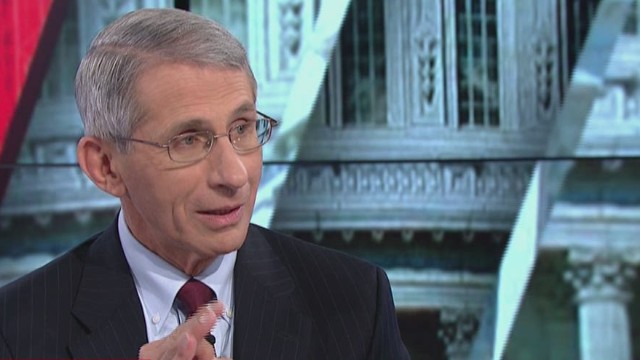
Top U.S. infectious disease specialist Dr. Anthony Fauci, pictured above, warned against placing mandatory quarantines on returning health workers, saying they could end up backfiring and threatening the health of the U.S. public.
Dr. Anthony Fauci, the Director of the National Institute of Allergies and Infectious Diseases at the National Institutes of Health, warned Sunday against “draconian” requirements for health care workers returning from West Africa, saying that mandatory quarantines go too far and are not supported by scientific evidence.
“I don’t want to be directly criticizing the decision that was made but we have to be careful that there aren’t unintended consequences,” Dr. Fauci said of the 21-day mandatory quarantines instituted at airports in New York and New Jersey. “As a scientist and as a health person, if I were asked, I would not have recommended that.”
“[W]e need to make the decisions based on scientific data,” he added.
Dr. Fauci, the nation’s top government infectious disease specialist, said that aggressive protocols indiscriminately targeting all health workers who fight the disease do not address an actual risk to the public and are not backed up by good science. In fact, said Dr. Fauci, such measures could ultimately threaten public health in the United States.
“The evidence tells us that people who are without symptoms are not a threat to transmitting it. You don’t get Ebola unless you come into direct contact with body fluid,” Dr. Fauci told ABC‘s ‘This Week’ on Sunday morning. “If you put everyone in one basket, even people who are clearly no threat, then we have the problem of the disincentive of people that we need.”
“Let’s not forget the best way to stop this epidemic and protect America is to stop it in Africa,” added Dr. Fauci, “and you can really help stopping it in Africa if we have our people, our heroes, the health care workers, go there and help us to protect America. We need to treat returning people with respect.”
‘Unintended consequences’
The new policy, which was put into place by New York Gov. Andrew Cuomo and New Jersey Gov. Chris Christie, requires that any person returning to the US who has had contact with Ebola patients submit to a mandatory, 21-day quarantine. On Saturday, Illinois also imposed a mandatory quarantine for anyone passing through Chicago O’Hare Airport.
But the first quarantine case has so far been a disaster. Kaci Hickox, who was with the group Doctors Without Borders, said she was misdiagnosed with a fever upon her return to Newark Liberty International Airport. Hickox said she was treated like a “criminal” and detained for several hours in “a frenzy of disorganization” and “fear.” She tested negative for Ebola once she was allowed to leave the airport for a hospital, where she is now being quarantined.
Both Hickox, who first spoke out Saturday in a Dallas Morning News op-ed, and Dr. Fauci worried about what he termed the “unintended consequences” of the quarantine — that more workers would be discouraged from going to Africa to work to fight the virus.
“We have to be careful when we make policy, that we don’t have unintended consequences …. I’m concerned of the disincentive for the health care workers,” Dr. Fauci said. “I think people lose that the best way to protect us is to stop it in Africa.”
Returning health workers ‘made to feel like criminals and prisoners’
Ebola can only be transmitted by direct contact with the bodily fluids of someone who is showing symptoms of the disease. Experts say that monitoring those who have returned from West Africa and appear healthy through routine tests like taking one’s temperature can prevent even infected people from spreading the disease without discouraging future volunteers. Only four Ebola cases have occurred in the United States since the outbreak in West Africa. Dr. Fauci treated one of them, Dallas nurse Nina Pham, who has now recovered.
Another U.S. Ebola patient, Dr. Craig Spencer, tested positive for the disease a few days after returning from treating patients in Guinea. Because he had monitored himself regularly and went to the hospital after registering a fever of 100.3 degrees, it is very unlikely that he transmitted the disease to anyone else. He is now being quarantined, however, while he fights active symptoms.
Dr. Fauci’s comments were echoed today by Samantha Power, the U.S. ambassador to the United Nations. “All of us need to make clear what these health workers mean to us and how much we value their services, how much we value their contribution,” Power said Sunday on NBC’s “Meet the Press.” “We need to make sure they are treated like conquering heroes.”
“I sat alone in the isolation tent and thought of many colleagues who will return home to America and face the same ordeal,” Hickox wrote in her op-ed. “Will they be made to feel like criminals and prisoners?”
